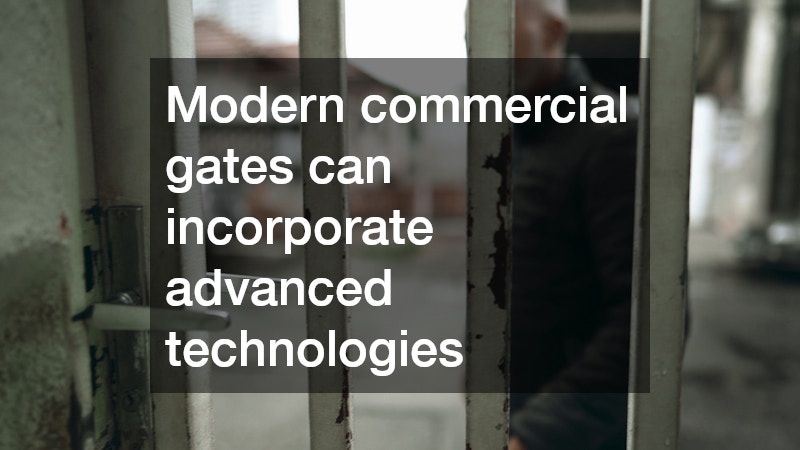Understanding the intricacies of purchasing commercial gates can be daunting due to the variety of options, technologies, and installation requirements involved. These are essential considerations to make an informed decision.
Types of Commercial Gates
Sliding gates are ideal for environments where space is limited since they open by sliding along a track and thus don’t require the clearance that swing gates do. This type of gate is often used in environments such as industrial areas and loading docks.
Swing gates, on the other hand, are more traditional and are often chosen for their aesthetic appeal and simplicity of design. They are common in settings like commercial buildings and residential complexes.
Barrier arm gates are another popular option, largely used in parking facilities or toll booths. They consist of a horizontal bar that ascends to allow vehicles to pass, offering a cost-effective and space-saving solution for controlled access areas. Lastly, vertical lift gates are a practical choice in settings that demand high security, such as military facilities or high-end commercial properties. They lift vertically and thus eliminate the need for side space. Each type of gate has its unique context where it functions optimally, depending on the user’s specific requirements.
The key to selecting the right type of commercial gate lies in understanding the specific needs of the area in which it will be installed. Consider logistical factors such as the amount of surrounding space, the expected volume of usage, and aesthetic preferences that align with the overall property design. By evaluating these aspects, businesses can select a gate type that not only fits the spatial and operational needs but also complements the existing architecture and landscape.
Material Choice
Steel is a popular choice for its strength and durability, offering security and a solid appearance. It is resistant to impacts and can withstand heavy use, making it suitable for high-security environments. However, steel is prone to corrosion if not treated with protective coatings, which adds to maintenance requirements.
Aluminum is lighter than steel and resistant to corrosion, making it a suitable option for gates exposed to harsh weather conditions. While not as strong as steel, aluminum gates require less maintenance and are easier to install due to their lightweight nature. They are often chosen for areas that require a balance between strength and ease of handling.
Wrought iron is another material used for its ornamental appeal and robustness. Known for its unique and intricate designs, wrought iron gates add an element of sophistication and elegance. While they require regular maintenance to prevent rust, they are often treated with powder coatings to increase their lifespan. The choice of material greatly influences the gate’s performance and longevity, so it’s crucial to weigh the benefits and trade-offs of each material based on the intended use and environment.
Security and Access
Modern commercial gates can incorporate advanced technologies such as keycard access, which allows authorized users to gain entry quickly. This system is beneficial for environments where it’s important to track and manage who enters the premises. Remote access systems permit gate operation from a distance, providing flexibility and additional control for property managers.
Biometric scanners have become increasingly popular for high-security installations, verifying identity via fingerprints or retinal scans. This technology offers an enhanced level of security by ensuring that only authorized personnel can gain entry, thus reducing the risk of unauthorized access. The integration of surveillance systems, such as CCTV cameras, complements these access control measures by allowing real-time monitoring of the gate area.
Deciding which security features to integrate into a commercial gate system largely depends on the specific security needs and potential threats of the property. It’s wise to conduct a security assessment to identify vulnerabilities and determine the required level of access control. By understanding the environment and potential risks, businesses can equip their gates with technologies that align with their security strategies.
Installation and Maintenance Requirements
The complexity of installing a commercial gate system can vary significantly depending on the type and features of the chosen gate. For example, sliding gates may require track installation and leveling, while swing gates need precise pivot points and clearance. Each installation process demands a different skill set and timeframe.
Beyond initial installation, ongoing maintenance is a vital consideration for ensuring the gate’s longevity and reliability. Regular inspections from professional services can help identify potential issues before they become major problems, and routine tasks like lubrication of moving parts and cleaning can prevent premature wear and tear.
Access to professional maintenance and repair services is crucial for quickly addressing any operational issues that may arise. Businesses should consider the availability and costs of such services when choosing a gate system to ensure they are prepared to keep the gate functioning optimally. Proper installation and maintenance not only extend the lifespan of the gate but also ensure the safety and security of the premises.
When purchasing commercial gates, thorough research and understanding of the types, materials, features, installation, and costs are crucial. By addressing these key questions, you can make a well-informed decision that aligns with your specific requirements and budget. Careful consideration of these elements will help ensure the chosen gate system provides dependable security and operational efficiency, adding lasting value to your property.



